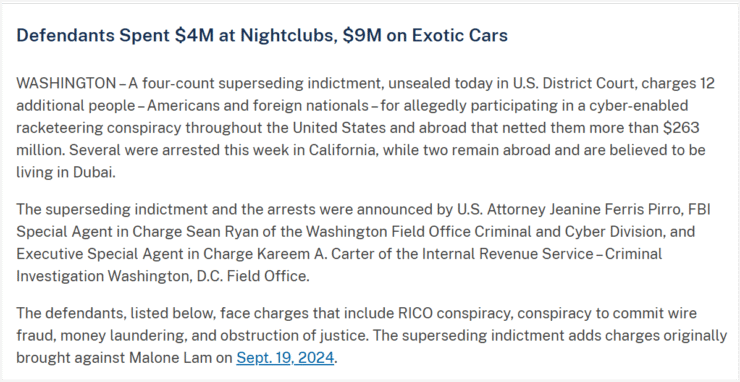U.S. federal authorities have charged 12 individuals in a sprawling crypto theft case involving over $263 million in stolen digital assets. The suspects, mostly between ages 18 and 21, are accused of executing an organized campaign of cyber intrusions, SIM-swap attacks, and identity theft to loot high-value crypto wallets—funds they allegedly used to bankroll an extravagant lifestyle.
According to a newly unsealed indictment, the scheme was spearheaded by a tight-knit crew of hackers who exploited leaked data and mobile vulnerabilities to gain unauthorized access to wallets. The case was unveiled Thursday by the U.S. Attorney’s Office for the District of Columbia, alongside the FBI and IRS Criminal Investigation Division.

Among those charged is 20-year-old Malone Lam, while another known figure, Jeandiel Serrano, was referenced in the investigation but not named in the indictment. The group reportedly flaunted their wealth across social media and exclusive events, indulging in $3 million supercars, half-million-dollar nightclub tables, and high-end rentals in cities like Miami and Los Angeles.
Arrests have been made in California, while international warrants have been issued for suspects believed to be hiding in Dubai. Two defendants remain unidentified, listed only by their online aliases.
RICO Charges Signal Serious Federal Strategy on Crypto Crime
Federal prosecutors are using powerful legal tools to bring the group to justice. Twelve of the 13 named suspects face conspiracy charges under the Racketeer Influenced and Corrupt Organizations (RICO) Act—typically used to dismantle organized crime rings. Additional charges include conspiracy to launder funds and commit wire fraud.
One suspect, 19-year-old John Tucker Desmond, faces obstruction of justice charges for allegedly destroying key evidence to hinder investigators.
The crackdown comes amid a dramatic surge in digital financial crime. The FBI’s Internet Crime Complaint Center reported $16.6 billion in internet-related financial losses in 2024—a 33% increase from the year before. Crypto-related fraud played a major role, with more than 149,000 complaints totaling $9.3 billion in losses—a 66% year-over-year spike.
The scale of the indictment underscores how federal agencies are increasingly prioritizing crypto crime—and leveraging RICO to elevate the severity of their cases.
Crypto Ring Spent Millions on Cars, Jets, and Clubs
The DOJ revealed how the group converted stolen digital assets into an opulent lifestyle, tracing a spree that spanned from October 2023 to March 2025. Prosecutors say the ring formed on gaming platforms, with members taking on specialized roles—some hacking databases, others posing as tech support, and a subset focused on laundering through peel chains, mixers, VPNs, and fake entities.
One of the most brazen incidents involved a home invasion in July 2024, when 19-year-old Marlon Ferro allegedly entered a New Mexico residence to physically steal a crypto wallet.
The spending spree was staggering: at least 28 exotic vehicles—including Lamborghinis, Ferraris, and Rolls-Royces—were purchased, alongside private jet charters and nightclub visits that topped $500,000 in a single night. Other purchases included designer watches, Hermes handbags, luxury real estate rentals, and even a custom gold grill for one member’s teeth.
According to the indictment, Lam allegedly continued directing aspects of the operation from jail, instructing others to deliver gifts to his romantic partner while he awaited trial.
Quick Facts
- The DOJ charged 12 people in a $263M crypto theft ring that used SIM-swapping, social engineering, and wallet hacks.
- Suspects spent millions on exotic cars, jets, handbags, and luxury events, flaunting their lifestyle on social media.
- Charges include RICO conspiracy, money laundering, and wire fraud—marking a major escalation in crypto crime enforcement.
- The FBI and IRS are leading the investigation, which remains active with further arrests and asset seizures expected.





